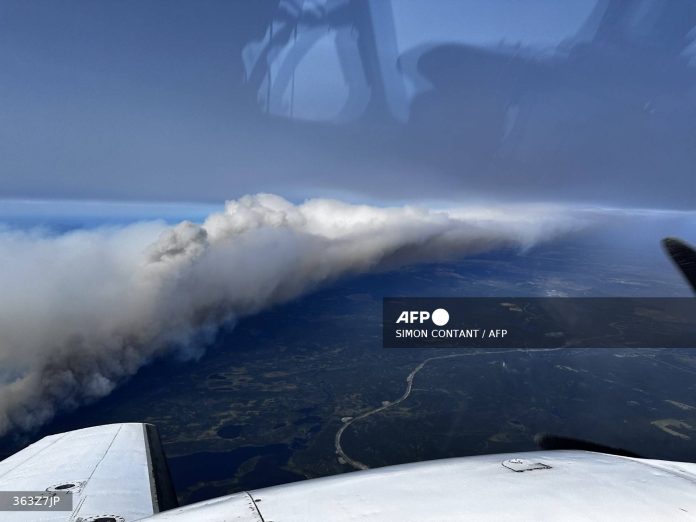

Around 9,000 people have been evacuated in northeastern Canada because of raging wildfires, officials said Saturday.
Residents of the towns of Labrador City and Wabush in Newfoundland and Labrador province were ordered to leave their homes, said provincial fire duty officer, Jeff Motty.
“We are seeing extreme fire behaviour out there. The fire is moving about 50 meters per minute,” Motty said.
Images shared on social media showed lines of cars waiting to fill up at gas stations as the sky was obscured by enormous clouds of smoke.
“It was quite a shock to see that much smoke,” Labrador City resident Stacy Hunt told public broadcaster CBC. “And it’s been in pretty much the same place for hours now.”
In this remote region residents must evacuate more than 500 kilometres (310 miles) east via the only road available.
Motty said that the intensity of the fire made it impossible to use water bombers.
On Saturday morning, Labrador City’s mayor, Belinda Adams, again urged residents to evacuate.
“The fire is still active,” she said in a video posted on social media.
Federal authorities said Friday that the weather had been favourable for limiting fires since the start of summer, but that the country was entering the peak wildfire season.
Last year, the country recorded the worst fire season in its history.
Drier and hotter conditions in many parts of the country caused by climate change have increased the risk of major fires in recent years, according to experts.
Canada is currently battling 575 active fires with more than 400 considered out of control. Many fires have broken out in recent days, particularly in the west of the country that has experienced a heat wave.
According Online reports that wildfires are large, uncontrolled fires that spread rapidly across vegetation, including forests, grasslands, and brush.
They can be caused by natural factors such as lightning or human activities like arson, campfires, or sparks from machinery.
Wildfires can have devastating effects on communities, wildlife, and the environment, leading to loss of life, property damage, and long-term ecological changes.
Managing and preventing wildfires involves a combination of strategies, including firebreaks, controlled burns, public education, and rapid response to outbreaks.
In 2017, thousands of Canadians were warned they could face evacuation under threat of huge forest fires that have already forced some 37,000 people from their homes in the west of the country.
The situation was worst in southern and central British Columbia.
AFP
Join Television Nigerian Whatsapp Now
Join Television Nigerian Facebook Now
Join Television Nigerian Twitter Now
Join Television Nigerian YouTUbe Now





